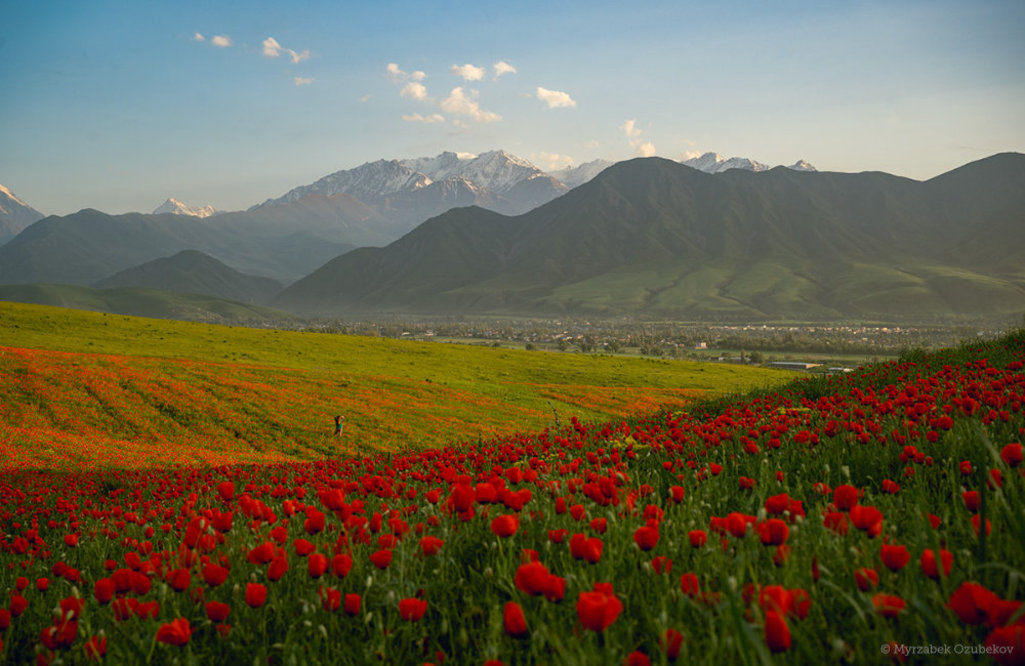A Journey to the Poppies

Poppy fields in Kyrgyzstan, © Photo: Myrzabek Ozubekov
Whether poppy or cotton – what makes the black seeds so precious? The bright red of the poppy blossoms delights and at the same time acts as a signal colour that also inspires you to reflect. With our new organic design bed linen "Poppy" Cotonea takes you on a little journey to the poppies...
Life on this earth can reproduce itself. This is the basic truth of life itself. Every human being, every animal, every plant reproduces. Although this truth has always been true, it is likely to change in the future. The breeding of hybrid seeds was already designed to ensure that a farmer would not be able to produce his own seeds, as it was always the case in the past, but would have to buy them from a seed company year after year. And this development has intensified significantly over the last 30 years. In addition to being non-reproducible, genetically modified seeds also come with patent protection for the seed company. In the meantime, the seed market is dominated by very few companies worldwide. In cotton, Monsanto has patented over 70% of all seeds and largely dominates the market. The seed is now turned into a yield / revenue generator in three ways:
- by selling the seeds to the farmers.
- by selling "tailored" pesticides to farmers. These are pesticides to which resistance has been built into the seeds. All other plants die from these strong pesticides, or more precisely herbicides. The consequence is the destruction of soils, biodiversity and human health, and it is therefore a disaster.
- by suing farmers whose fields were found to contain contamination of the manipulated seeds.
This development is devastating for the earth's arable soils and thus for the food supply of humanity. Cotonea's cultivation projects in Uganda and Kyrgyzstan do NOT use genetically modified cotton. Individual farmers in the cooperative with a lot of experience also produce the seed for the other farmers. No pesticides are used.
The success of this type of organic farming is that the soils are healthy and, in parallel with the improvement of soil organisms, higher and higher average yields are produced over the years. And further yield growth can be expected. We would like to draw attention to this really crucial aspect of organic farming with our new poppy flower design. With each poppy bedding set, you can look forward to a bag of organic poppy seeds (Papaver rhoeas). How nice it is to see more red, delicate poppies in our fields and gardens again.
Poppy is not cotton. But poppies are one of the plants that have almost completely disappeared from our native fields due to the use of pesticides. Sprawling poppy fields have become a rarity in recent decades. Their decline was gradual, so that we got used to it and we did not notice that the red-blooming beauties can only be found sporadically on the edges of fields and paths. In this country, the time of magnificent poppy fields seems to live on and remind us only in paintings such as those by Claude Monet (1840–1926). Although rarer, the poppy flower is hard to miss with its striking coloration. Its bright red is like a signal colour that can also make us reflect. It also exemplifies the fate of many other field and meadow flowers, whose decline we are observing. The disappearance of the poppy plant, which is considered a useless weed, is a loss for the ecosystem, because the cheerful red flowers are not only aesthetically pleasing, but also feed a variety of native insects with their abundant pollen.
But it is not only here in Germany that poppies are characteristic of the original, native nature, but also in a country right in the heart of the Eurasian continent: Kyrgyzstan. A country with whose inhabitants and landscape Cotonea also has a special relationship, because this is where our organic cotton grows and thrives under the careful hand of our trained organic farmers. Far more spectacular in its colour than the cotton blossom, the poppy with over 70 indigenous varieties is probably as well known for Kyrgyzstan as the cherry blossom is for Japan. The poppies bloom throughout May. First on the plains and valleys, then the fiery red flowers migrate to the foothills and higher altitudes. It is a natural spectacle that attracts not only the locals but also tourists from all over the world every year. We have captured this flowering period, which lasts only a few weeks, on our organic poppy bed linen and so the red blaze of colour will delight you for a long time to come.